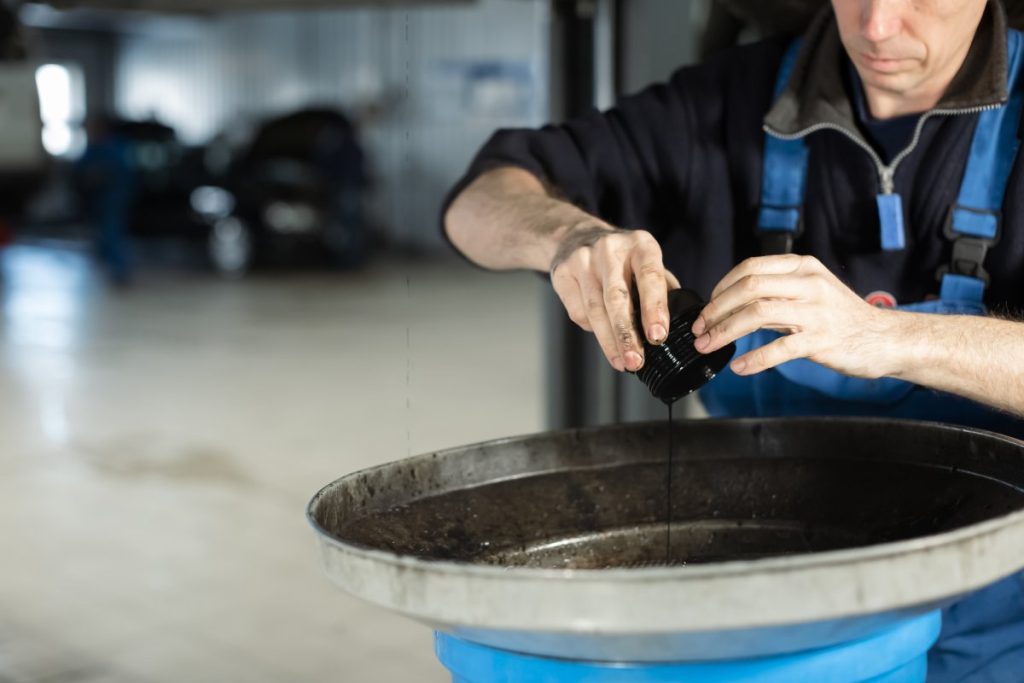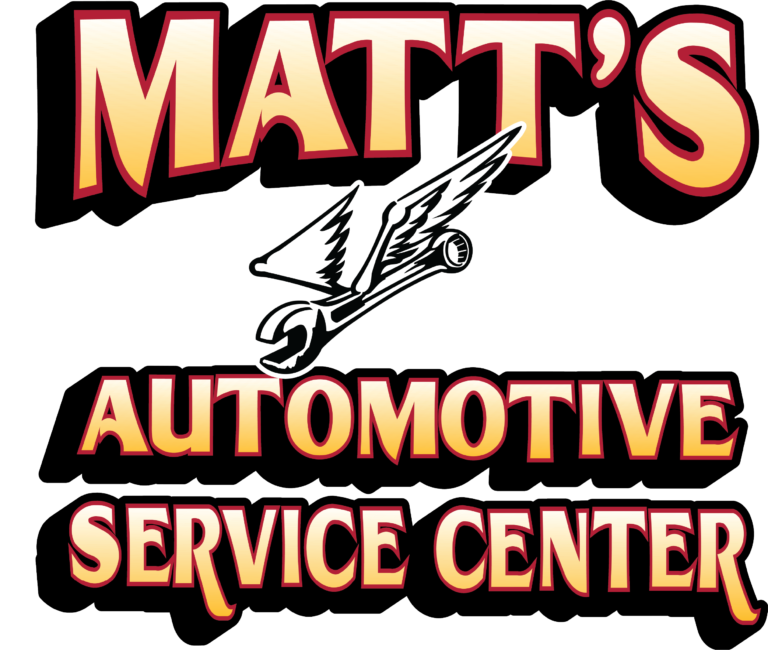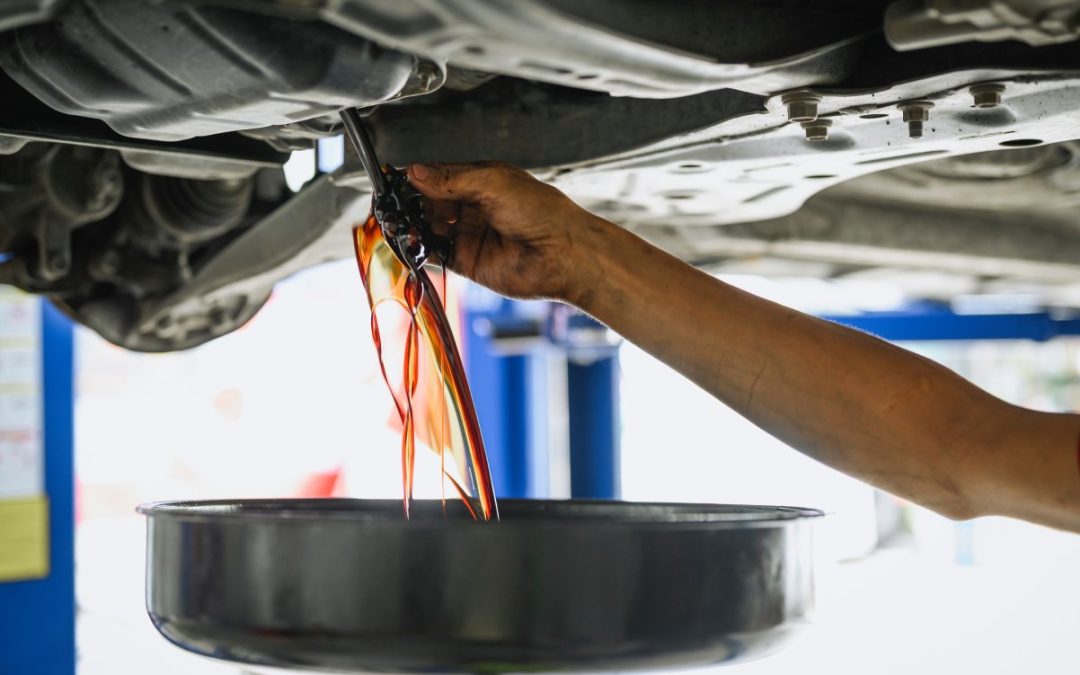Home » How Skipping Oil Changes Can Wreck Your Engine
- Skipping Oil Changes Leads to Engine Sludge Buildup
- Old Oil Can Cause Overheating and Engine Seizure
- Increased Friction: The Hidden Enemy Inside Your Engine
- How Delayed Oil Changes Shorten Engine Lifespan
- From Wear to Failure: The Step-by-Step Damage of Neglecting Oil Changes
- The Snowball Effect: Small Neglect, Big Engine Problems
- The Bottom Line: Consistent Oil Changes Keep Your Engine Alive
- Matt’s Automotive Service Center in Fargo-Moorhead
- Frequently Asked Questions
- Fargo Oil Change Service
- Moorhead Oil Change Service

It’s one of the simplest and most affordable things you can do for your car, but it’s also one of the easiest to put off: the regular oil change service. We all lead busy lives, and sometimes that little sticker reminding you of your next oil change just gets ignored. Maybe you think you can push it a few more miles, or perhaps you figure it’s no big deal.
Think again.
At Matt’s Automotive Service Center, we’ve seen the catastrophic results of neglecting this basic maintenance task. The simple truth is, understanding what happens if you don’t change your oil is the difference between a reliable ride and a devastating, wallet-draining repair bill. Ignoring your oil is like telling the heart of your car to run without blood—eventually, everything seizes up.
We believe in making the auto repair experience better, setting a new benchmark for excellence across our Fargo-Moorhead and Minneapolis-St. Paul’s locations. Our goal is to keep you safely on the road, and that starts with prevention. Let’s dive into the scary truth about engine damage from no oil change and why this routine service is your engine’s best friend.
Skipping Oil Changes Leads to Engine Sludge Buildup
Your car’s engine oil isn’t just a lubricant; it’s also a cleaner. As it circulates, it picks up tiny bits of dirt, metal shavings, and combustion byproducts (like soot and carbon). The oil is designed to hold these contaminants in suspension until you drain it during a scheduled oil change.
What happens if you skip that service?
Over time, the oil’s cleaning additives break down, and the oil itself starts to degrade due to heat and oxidation. This chemical process thickens the oil, turning it into a dark, thick, jelly-like substance known as engine sludge.
This engine sludge is a killer. It gums up vital engine parts, clogs the narrow oil passages that deliver oil to critical components, and starves the engine of the fresh, clean lubricant it desperately needs. Once sludge starts to form, it’s a vicious cycle that accelerates engine wear.
Old Oil Can Cause Overheating and Engine Seizure
One of oil’s primary jobs is to help cool the engine. As parts move, they create friction, and friction creates heat. The oil absorbs a significant amount of this heat and transfers it to the oil pan, where the heat can dissipate.
When the oil is old, dirty, and broken down, its ability to transfer heat plummets. It becomes thinner than it should be when hot, failing to provide the protective film necessary, or it becomes thick with sludge, which doesn’t flow well. In either case, the engine temperature begins to climb dramatically.
The result? Overheating.
If your engine overheats because the oil has failed to do its job, the internal metal components can expand beyond their normal tolerances. In the worst-case scenario, parts like pistons and cylinders can actually weld themselves together—a catastrophic event known as engine seizure. At that point, the engine is completely destroyed, and the only remedy is a total replacement or a costly, complex rebuild. This is the ultimate lesson in why you need to prevent engine failure with a timely oil change.
Increased Friction: The Hidden Enemy Inside Your Engine
Modern engines are marvels of engineering, designed with incredibly tight tolerances. They rely on a microscopic film of oil between moving metal parts—like between the crankshaft and its bearings, or the pistons and the cylinder walls—to prevent metal-on-metal contact.
Dirty, degraded oil loses its viscosity and lubricating properties. It can’t maintain that protective film as effectively. When that film breaks down, even for a moment, you get increased friction.
This increased friction is the hidden enemy that tirelessly grinds down your engine from the inside. It leads to:
- Scoring: Deep scratches on cylinder walls and other critical surfaces.
- Bearing Wear: The protective layers on engine bearings wear away, leading to knocking sounds.
- Metal Shavings: Tiny particles of metal break off and circulate, acting like sandpaper throughout the rest of the engine.
If you ever notice the oil on your dipstick is pitch black, thick, or smells burnt, these are clear signs you need an oil change right now. Waiting will only allow this internal grinding to continue, dramatically accelerating the wear process.
How Delayed Oil Changes Shorten Engine Lifespan
Every time you neglect an oil change, you are essentially shaving miles off your engine’s useful life. An engine that is consistently serviced with fresh, high-quality oil can easily last for hundreds of thousands of miles. An engine that is frequently run on old, contaminated oil will struggle to make it past 100,000 miles without major problems.
It’s all about cumulative damage. The tiny bits of wear caused by one delayed oil change add to the wear caused by the next one. This means your engine, over time:
- Loses Power: Increased friction and gunk buildup mean the engine has to work harder to perform.
- Burns More Fuel: Inefficient operation due to internal wear and friction lowers your fuel economy.
- Develops Leaks: Old oil can be corrosive and cause seals and gaskets to harden and crack, leading to oil leaks.
The question of how often should you change your oil has an answer that depends on your car, your driving habits, and the type of oil you use, but the most important thing is consistency. Following the manufacturer’s recommendations or the advice of your trusted mechanics at Matt’s Automotive Service Center is the best way to maximize your engine’s longevity.
From Wear to Failure: The Step-by-Step Damage of Neglecting Oil Changes
Let’s trace the unfortunate journey of an engine starved of proper lubrication:
- The Breakdown: The oil’s detergents and dispersants are depleted, and the oil starts to oxidize and thicken.
- The Grime: Sludge and varnish begin to coat internal parts, blocking oil passages and preventing proper heat transfer.
- The Grinding: Metal-on-metal contact begins in high-stress areas like the camshafts and bearings, creating metal debris.
- The Knock: Severe bearing wear leads to a distinct “knocking” sound, indicating a loose component inside the engine.
- The Seizure: The engine overheats and critical moving parts fuse together, resulting in total, non-functional failure.
This progression shows why regular car maintenance and oil change services are non-negotiable. It’s an investment in your peace of mind and the long-term health of your vehicle.
The Snowball Effect: Small Neglect, Big Engine Problems
Neglecting your oil change is rarely an isolated incident in terms of damage. It creates a domino effect throughout your entire powertrain.
For instance, sludge buildup can affect components you might not immediately associate with lubrication, such as the turbocharger (if your car has one). Turbochargers spin at incredibly high speeds and rely on a constant flow of pristine oil for cooling and lubrication. Sludge can quickly destroy a turbo, leading to a repair that can cost thousands of dollars on its own.
Furthermore, a struggling engine puts stress on other systems, like the transmission and cooling system. Everything in your vehicle is interconnected. By committing to consistent oil change benefits for engine health, you aren’t just protecting the engine; you’re protecting your entire vehicle investment from the “snowball effect” of cascading failures.
How Skipping Oil Changes Can Lead to Costly Engine Repairs
This is where the rubber meets the road—or, more accurately, where the lack of oil meets the engine block. People often skip oil changes to save a small amount of money, perhaps $\$50$ to $\$100$. This decision, however, can quickly turn into a repair bill that is 20, 50, or even 100 times that initial cost.
Here are just a few examples of repairs resulting from a lack of professional oil change service:
- Camshaft/Timing Chain Replacement: Worn components due to friction and poor lubrication.
- Engine Bearing Failure/Engine Knock: This is often the precursor to total failure and can require a full engine teardown.
- Engine Replacement: The ultimate and most expensive fix.
The difference between a $\$75$ routine oil change and a $\$6,000$ engine replacement is a few stickers in your windshield that you chose to ignore. At Matt’s Automotive Service Center, our team of specialized car technicians believes in providing transparent, quality service that saves you money in the long run. We’re here to help you avoid these catastrophic failures.
The Bottom Line: Consistent Oil Changes Keep Your Engine Alive
Your vehicle is a major investment, and the engine is its most valuable asset. Treating it with consistent, routine oil changes is the single best way to ensure maximum performance, fuel efficiency, and a long life.
We are a family-owned and operated business with a commitment to earning and maintaining the unwavering trust of our valued customers. With 10 locations across Minnesota and North Dakota, we have built our reputation on expertise and a promise to go above and beyond a typical auto repair experience.
Don’t wait for the knocking, the smoke, or the catastrophic failure. If you are overdue or unsure when your last oil change was, now is the time to act.
Matt’s Automotive Service Center in Fargo-Moorhead
Ready to protect your engine from devastating, costly damage?
The dedicated and skilled auto mechanics at Matt’s Automotive Service Center are here to provide the fast, friendly, and expert oil change service your vehicle deserves. We’ll use the right oil and filter for your specific car, ensuring peak performance and longevity.
Visit one of our convenient locations in the Fargo-Moorhead or Minneapolis-St. Paul today!
Contact us at 701-478-3838 or reach us on our Facebook page. Book your next professional oil change service online or call Matt’s Automotive Service Center now!
Frequently Asked Questions
What happens if I skip an oil change?
Skipping oil changes leads to oil breakdown, sludge buildup, and reduced lubrication. This causes overheating, increased friction, and accelerated engine wear that can ultimately destroy your engine.
How long can my car go without an oil change?
Most vehicles can go 3,000–7,500 miles, depending on oil type and manufacturer guidelines. Pushing past that limit increases the risk of sludge, overheating, and costly engine damage.
What are the signs that my engine oil needs changing?
Dark, thick, or burnt-smelling oil, loud engine noises, poor fuel economy, knocking sounds, and dashboard oil warnings are all signs you need an immediate oil change.
Can old oil cause my engine to overheat?
Yes. Old or degraded oil loses its ability to absorb and dissipate heat. This leads to rising engine temperatures, which can cause overheating and even total engine seizure.
What kind of engine damage can occur from not changing oil?
Neglecting oil changes can cause sludge formation, bearing wear, scoring on cylinder walls, metal-on-metal friction, timing chain damage, and ultimately full engine failure.
How do regular oil changes extend engine life?
Fresh oil provides proper lubrication, cooling, and cleaning of engine components. Consistent oil changes reduce friction, prevent sludge, improve fuel efficiency, and help your engine last for hundreds of thousands of miles.


Recent Comments